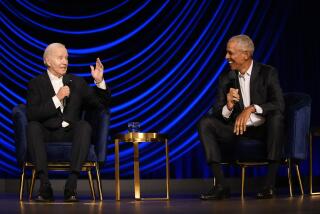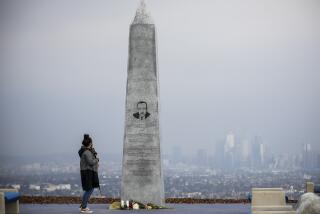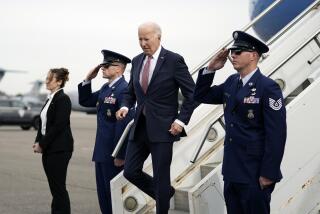Take ‘the bullet’ out, Obama says
Invoking images of Los Angeles in flames, Sen. Barack Obama argued Sunday -- the 15th anniversary of the nation’s most violent modern civil uprising -- that little had been done to fix the chronic social and economic conditions that gave rise to a three-day rampage that killed at least 53 people.
And although the riots occurred in L.A., the conditions that spawned them persist across the nation, Obama told an overflow crowd at South-Central’s First AME Church. The Illinois Democrat is seeking his party’s presidential nomination.
“There wasn’t anything going on in Los Angeles that was unique to Los Angeles,” Obama said. “If you traveled to Chicago, you would see the same young men on street corners without hope, without prospects, and without a sense of any destiny other than ending up in prison or in a casket.”
Obama drew a sustained ovation when he rebuked the Bush administration for, as Obama put it, funding the war in Iraq instead of impoverished Americans -- particularly those in minority neighborhoods.
“We have now spent half a trillion dollars on a war that should have never been authorized, and should have never been waged,” Obama said. “We could have invested that money in SouthCentral Los Angeles, or the South Side of Chicago, in jobs and infrastructure and hospitals and schools. Why is it we can find the money in a second for a war that doesn’t make any sense?”
His speech was the most direct address on race by any of the major presidential candidates who were in California over the weekend for the Democratic National Convention in San Diego.
And it came as the major Democratic contenders are vying for African American support. A Los Angeles Times/Bloomberg poll conducted April 5 to 9 found that 41% of African American voters surveyed backed Sen. Hillary Rodham Clinton of New York, 34% supported Obama and 3% backed former North Carolina Sen. John Edwards.
Clinton, whose husband received strong African American support in both his presidential elections, made a passing reference of the riots in her speech Saturday to the San Diego convention. After mentioning “the chaos and violence in those days and the anger and despair that boiled over into the streets,” she endorsed ethnic diversity and called for border policies that recognized “immigration has been and still is the lifeblood of the United States.”
Edwards said in his convention speech Sunday that “if you are a man or woman of color in America today, you are more likely to live in poverty” and have a higher risk of cancer, heart disease and other problems.
“The one thing we have to be willing to face up to -- and I mean head on -- is that race ... plays an enormous role in what’s happening,” said Edwards, reprising what is for him a familiar theme. He did not mention the riots.
“We have to be honest about the problem,” Edwards said. “The racial and economic segregation that exists in America is not all right.”
Clinton and Edwards are white.
Obama, whose father is black and mother is white, did not mention the 1992 conflagration to the convention Saturday, but he made it the primary focus of his speech Sunday morning from the pulpit of one of SouthCentral’s most vibrant African American churches.
And he touched on the frustration that has run through community meetings held in recent days to commemorate the riots, in which 2,300 people were injured and more than 1,100 buildings were damaged or destroyed after a jury acquitted Los Angeles police officers in the beating of black motorist Rodney G. King.
Obama did not offer specific proposals to solve the problems he described. His approach has more often relied on lofty rhetoric than real-world prescriptions.
In Obama’s South-Central appearance, dozens of Los Angeles police officers were deployed in and around the neighborhood, and a mobile command vehicle was parked around a nearby corner.
The security contrasted sharply with the San Diego convention, where few police could be seen despite the raft of presidential contenders.
Speaking in a church that has a stained-glass window depicting the Rev. Martin Luther King Jr. and President Kennedy and his brother Robert, Obama recalled a news article he read at the time of the riots about a young pregnant woman shot in the abdomen, the bullet lodging in the soft tissue of her fetus’ arm. After surgery, the mother and baby were fine, although the infant was left with a scar.
Obama made the infant -- and the bullet -- symbols for L.A. after the riots.
“Even in the midst of violence and despair, there’s always something to be hopeful for. That baby represents the rising up of hope out of darkness and despair,” he said.
“It made me think about us in this country 15 years later, how not only do we still have scars from that riot, but in many American cities we haven’t even taken the bullet out,” he said. “We still haven’t stitched up the patient.”
The problems were exposed again with Hurricane Katrina in 2005, he said, when countless poor people had no way to leave their neighborhoods ahead of the floodwaters. Many perished, or were left stranded on rooftops for days.
“The tragedy struck New Orleans long before the hurricane hit,” Obama said, citing lowperforming schools and high levels of violence and poverty. “There’s a reason why the planning to evacuate them was ineffective -- because the folks who were making the planning assumed that people had cars.”
The parallels to Los Angeles in the years since the riots are clear, he said: At neither time has there been sustained public interest in correcting underlying problems.
“We go from shock to trance,” Obama said. “We wake up and we’re surprised that there’s poverty in our midst, and that people are frustrated and angry.”
He mocked the creation of investigative panels to divine the causes of problems.
“There’s a little bit of money that folks piece together to send it into the community to make sure that folks are quiet and go back to the status quo, but we never take the bullet out of the arm,” Obama said. “We don’t need panels and reports and commissions. We need some surgery on the indifference to poverty in this country.”
*
Times staff writer Maeve Reston in San Diego contributed to this report.
More to Read
Get the L.A. Times Politics newsletter
Deeply reported insights into legislation, politics and policy from Sacramento, Washington and beyond. In your inbox three times per week.
You may occasionally receive promotional content from the Los Angeles Times.










